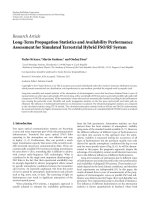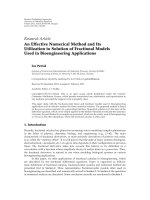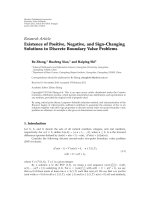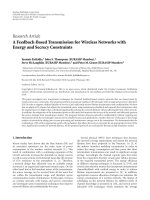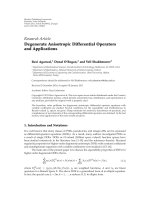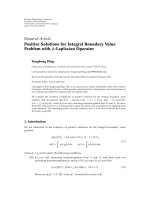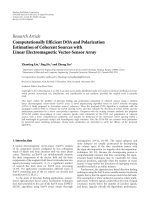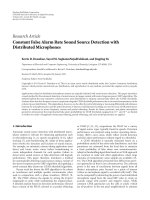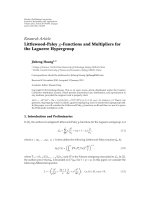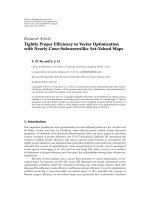Báo cáo hóa học: "Research Article Multiple Twisted q-Euler Numbers and Polynomials Associated with p-Adic q-Integrals" doc
Bạn đang xem bản rút gọn của tài liệu. Xem và tải ngay bản đầy đủ của tài liệu tại đây (506.29 KB, 11 trang )
Hindawi Publishing Corporation
Advances in Difference Equations
Volume 2008, Article ID 738603, 11 pages
doi:10.1155/2008/738603
Research Article
Multiple Twisted q-Euler Numbers and Polynomials
Associated with p-Adic q-Integrals
Lee-Chae Jang
Department of Mathematics and Computer Science, Konkuk University,
Chungju 380701, South Korea
Correspondence should be addressed to Lee-Chae Jang,
Received 14 January 2008; Revised 25 February 2008; Accepted 26 February 2008
Recommended by Martin Bohner
By using p-adic q-integrals on
Z
p
,wedefinemultipletwistedq-Euler numbers and polynomials.
We also find Witt’s type formula for multiple twisted q-Euler numbers and discuss some
characterizations of multiple twisted q-Euler Zeta functions. In particular, we construct multiple
twisted Barnes’ type q-Euler polynomials and multiple twisted Barnes’ type q-Euler Zeta functions.
Finally, we define multiple twisted Dirichlet’s type q-Euler numbers and polynomials, and give
Witt’s type formula for them.
Copyright q 2008 Lee-Chae Jang. This is an open access article distributed under the Creative
Commons Attribution License, which permits unrestricted use, distribution, and reproduction in
any medium, provided the original work is properly cited.
1. Introduction
Let p be a fixed odd prime number. Throughout this paper,
Z
p
, Q
p
,andC
p
are, respectively, the
ring of p-adic rational integers, the field of p-adic rational numbers, and the p-adic completion
of the algebraic closure of
Q
p
.Thep-adic absolute value in C
p
is normalized so that |p|
p
1/p.
When one talks about q-extension, q is variously considered as an indeterminate, a complex
number, q ∈
C or a p-adic number q ∈ C
p
.Ifq ∈ C, one normally assumes that |q| < 1. If q ∈ C
p
,
one normally assumes that |1 − q|
p
<p
−1/p−1
so that q
x
expx log q for each x ∈ Z
p
. We use
the notations
x
q
1 − q
x
1 − q
, x
−q
1 − −q
x
1 q
1.1
cf. 1–14, for all x ∈
Z
p
. For a fixed odd positive integer d with p, d1, set
X X
d
lim
←
n
Z/dp
n
Z,X
1
Z
p
,
2 Advances in Difference Equations
X
∗
0<a<dp
a,p1
a dpZ
p
,
a dp
n
Z
p
x ∈ X | x ≡ a
mod dp
n
,
1.2
where a ∈
Z lies in 0 ≤ a<dp
n
. For any n ∈ N,
μ
q
a dp
n
Z
p
q
a
dp
n
q
1.3
is known to be a distribution on X cf. 1–28.
We say that f is uniformly differentiable function at a point a ∈
Z
p
and denote this
property by f ∈ UD
Z
p
if the difference quotients
F
f
x, y
fx − fy
x − y
1.4
have a limit l f
a as x, y → a, acf. 25.
The p-adic q-integral of a function f ∈ UD
Z
p
was defined as
I
q
f
Z
p
fxdμ
q
x lim
n→∞
1
p
n
q
p
n
−1
x0
fxq
x
,
1.5
I
−q
f
Z
p
fxdμ
−q
x lim
n→∞
1
p
n
q
p
n
−1
x0
fx−q
x
,
1.6
cf. 4, 24, 25, 28,from1.6,wederive
qI
−q
f
1
I
−q
f2
q
f0, 1.7
where f
1
xfx 1.Ifwetakefxe
tx
,thenwehavef
1
xe
tx1
e
tx
e
t
.From1.7,
we obtain that
I
−q
e
tx
2
q
qe
t
1
. 1.8
In Section 2, we define the multiple twisted q-Euler numbers and polynomials on
Z
p
and find Witt’s type formula for multiple twisted q-Euler numbers. We also have sums of
consecutive multiple twisted q-Euler numbers. In Section 3, we consider multiple twisted q-
Euler Zeta functions which interpolate new multiple twisted q-Euler polynomials at negative
integers and investigate some characterizations of them. In Section 4, we construct the multiple
twisted Barnes’ type q-Euler polynomials and multiple twisted Barnes’ type q-Euler Zeta
functions which interpolate new multiple twisted Barnes’ type q-Euler polynomials at negative
integers. In Section 5, we define multiple twisted Dirichlet’s type q-Euler numbers and
polynomials and give Witt’s type formula for them.
Lee-Chae Jang 3
2. Multiple twisted q-Euler numbers and polynomials
In this section, we assume that q ∈
C
p
with |1 − q|
p
< 1. For n ∈ N, by the definition of p-adic
q-integral on
Z
p
,wehave
q
n
I
−q
f
n
−1
n−1
I
−q
f2
q
n−1
x0
−1
n−1−x
q
x
fx, 2.1
where f
n
xfx n.Ifn is odd positive integer, we have
q
n
I
−q
f
n
I
−q
f2
q
n−1
x0
−1
n−1−x
q
x
fx. 2.2
Let T
p
∪
n≥1
C
p
n
lim
n→∞
C
p
n
C
p
∞
be the locally constant space, where C
p
n
{w |
w
p
n
1} is the cyclic group of order p
n
.Forw ∈ T
p
, we denote the locally constant function by
φ
w
: Z
p
−→ C
p
,x−→ w
x
, 2.3
cf. 5, 7–14, 16, 18.Ifwetakefxφ
w
xe
tx
,thenwehave
Z
p
e
tx
φ
w
xdμ
−q
x
2
q
qwe
t
1
. 2.4
Now we define the twisted q-Euler numbers E
q
n,w
as follows:
F
w
t
2
q
qwe
t
1
∞
no
E
q
n,w
t
n
n!
. 2.5
We note that by substituting w 1, lim
q→1
E
q
n,1
E
n
are the familiar Euler numbers. Over five
decades ago, Carlitz defined q-extension of Euler numbers cf. 15.From2.4 and 2.5,we
note that Witt’s type formula for a twisted q-Euler number is given by
Z
p
x
n
w
x
dμ
−q
xE
q
n,w
. 2.6
for each w ∈ T
p
and n ∈ N.
Twisted q-Euler polynomials E
q
n,w
x are defined by means of the generating function
F
q
w
t, x
2
q
qwe
t
1
e
xt
∞
n0
E
q
n,w
x
t
n
n!
, 2.7
where E
q
n,w
0E
q
n,w
. By using the hth iterative fermionic p-adic q-integral o n Z
p
, we define
multiple twisted q-Euler number as follows:
Z
p
···
Z
p
h-times
w
x
1
···x
h
e
x
1
x
2
···x
h
t
dμ
−q
x
1
···dμ
−q
x
h
2
q
qwe
t
1
h
∞
n0
E
h,q
n,w
t
n
n!
.
2.8
Thus we give Witt’s type formula for multiple twisted q-Euler numbers as follows.
4 Advances in Difference Equations
Theorem 2.1. For each w ∈ T
p
and h, n ∈ N,
Z
p
···
Z
p
h-times
w
x
1
···x
h
x
1
··· x
h
n
dμ
−q
x
1
···dμ
−q
x
h
E
h,q
n,w
, 2.9
where
x
1
··· x
h
n
l
1
···l
h
n
l
1
, ,l
h
≥0
n!
l
1
! ···l
h
!
x
l
1
1
···x
l
h
h
. 2.10
From 2.8 and 2.9, we o btain the following theorem.
Theorem 2.2. For w ∈ T
p
and h, k ∈ N,
E
h,q
k,w
l
1
···l
h
k
l
1
, ,l
h
≥0
k!
l
1
! ···l
h
!
E
q
l
1
,w
···E
q
l
h
,w
. 2.11
From these formulas, we consider multivariate fermionic p-adic q-integral on
Z
p
as
follows:
Z
p
···
Z
p
h-times
w
x
1
···x
h
e
x
1
···x
h
xt
dμ
−q
x
1
···dμ
−q
x
h
2
q
qwe
t
1
···
2
q
qwe
t
1
e
xt
2
q
qwe
t
1
h
e
xt
.
2.12
Then we can define the multiple twisted q-Euler polynomials E
h,q
n,w
x as follows:
F
h,q
w
t, x
2
q
qwe
t
1
h
e
xt
∞
n0
E
h,q
n,w
x
t
n
n!
. 2.13
From 2.12 and 2.13,wenotethat
∞
n0
Z
p
···
Z
p
h-times
w
x
1
···x
h
x
1
··· x
h
x
n
dμ
−q
x
1
···dμ
−q
x
h
t
n
n!
∞
n0
E
h,q
n,w
x
t
n
n!
. 2.14
Then by the kth differentiation on both sides of 2.14, we obtain the following.
Theorem 2.3. For each w ∈ T
p
and k, h ∈ N,
Z
p
···
Z
p
h-times
w
x
1
···x
h
x
1
··· x
h
x
k
dμ
−q
x
1
···dμ
−q
x
h
E
h,q
k,w
x. 2.15
Lee-Chae Jang 5
Note that
x
1
··· x
h
x
n
l
1
···l
h
n
l
1
, ,l
h
≥0
n!
l
1
! ···l
h
!
x
l
1
1
· x
l
2
2
···x
h
x
l
h
. 2.16
Then we see that
Z
p
···
Z
p
h-times
w
x
1
···x
h
x
1
··· x
h
x
k
dμ
−q
x
1
···dμ
−q
x
h
l
1
···l
h
k
l
1
, ,l
h
≥0
k!
l
1
! ···l
h
!
Z
p
w
x
1
x
l
1
1
dμ
−q
x
1
···
Z
p
w
x
h−1
x
l
h−1
h−1
dμ
−q
x
h−1
Z
p
x x
h
l
h
dμ
−q
x
h
l
1
···l
h
k
l
1
, ,l
h
≥0
k!
l
1
! ···l
h
!
E
q
l
1
,w
···E
q
l
h−1
,w
E
q
l
h
,w
x.
2.17
From 2.15 and 2.17, we obtain the sums of powers of consecutive q-Euler numbers as
follows.
Theorem 2.4. For each w ∈ T
p
and k, h ∈ N,
E
h,q
k,w
x
l
1
···l
h
k
l
1
, ,l
h
≥0
k!
l
1
! ···l
h
!
E
q
l
1
,w
···E
q
l
h−1
,w
· E
q
l
h
,w
x. 2.18
3. Multiple twisted q-Euler Zeta functions
For q ∈
C with |q| < 1andw ∈ T
p
, the multiple twisted q-Euler numbers can be considered as
follows:
F
h
w
t
2
q
qwe
t
1
h
∞
n0
E
h,q
n,w
t
n
n!
,
t logqw
<π. 3.1
From 3.1,wenotethat
∞
n0
E
h,q
n,w
t
n
n!
F
h
w
t
2
q
qwe
t
1
h
2
h
q
2
q
qwe
t
1
···
2
q
qwe
t
1
2
h
q
∞
n
1
0
−1
n
1
q
n
1
w
n
1
e
n
1
t
···
∞
n
h
0
−1
n
h
q
n
h
w
n
h
e
n
h
t
2
h
q
n
1
, ,n
h
0
−1
n
1
···n
h
q
n
1
···n
h
w
n
1
···n
h
e
n
1
···n
h
t
.
3.2
6 Advances in Difference Equations
By the kth differentiation on both sides of 3.2 at t 0, we obtain that
E
h,q
k,w
2
h
q
n
1
···n
h
/
0
n
1
, ,n
h
≥0
−1
n
1
···n
h
q
n
1
···n
h
w
n
1
···n
h
n
1
··· n
h
k
. 3.3
From 3.3, we derive multiple twisted q-Euler Zeta function as follows:
ζ
h,q
w
s2
h
q
n
1
···n
h
/
0
n
1
, ,n
h
≥0
−1
n
1
···n
h
q
n
1
···n
h
w
n
1
···n
h
n
1
··· n
h
s
3.4
for all s ∈
C. We also obtain the following theorem in which multiple twisted q-Euler Zeta
functions interpolate multiple twisted q-Euler polynomials.
Theorem 3.1. For w ∈ T
p
and k, h ∈ N,
ζ
h,q
w
−kE
h,q
k,w
. 3.5
4. Multiple twisted Barnes’ type q-Euler polynomials
In this section, we consider the generating function of multiple twisted q-Euler polynomials:
F
h
w
t, x
2
q
qwe
t
1
h
e
xt
∞
n0
E
h,q
n,w
x
t
n
n!
,
t logqw
<π, Rex > 0.
4.1
We note that
∞
n0
E
h,q
n,w
x
t
n
n!
F
h
w
t, x 2
h
q
n
1
, ,n
h
0
−1
n
1
···n
h
q
n
1
···n
h
w
n
1
···n
h
e
n
1
···n
h
xt
. 4.2
By the kth differentiation on both sides of 4.2 at t 0, we obtain that
E
h,q
k,w
x 2
h
q
n
1
, ,n
h
0
−1
n
1
···n
h
q
n
1
···n
h
w
n
1
···n
h
n
1
··· n
h
x
k
. 4.3
Thus we can consider multiple twisted Hurwitz’s type q-Euler Zeta function as follows:
ζ
h,q
w
s, x2
h
q
n
1
···n
h
/
0
n
1
, ,n
h
≥0
−1
n
1
···n
h
q
n
1
···n
h
w
n
1
···n
h
n
1
··· n
h
x
s
4.4
for all s ∈
C and Rex > 0. We note that ζ
h,q
w
s, x is analytic function in the whole complex
s-plane and ζ
h,q
w
s, 0ζ
h,q
w
s. We also remark that if w 1andh 1, then ζ
1,q
1
s, x
ζ
q
s, x is Hurwitz’s type q-Euler Zeta function see 7, 27. The following theorem means
that multiple twisted q-Euler Zeta functions interpolate multiple twisted q-Euler polynomials
at negative integers.
Lee-Chae Jang 7
Theorem 4.1. For w ∈ T
p
, k, h ∈ N, s ∈ C,andRex > 0,
ζ
h,q
w
−k, xE
h,q
k,w
x. 4.5
Let us consider
F
h
w
a
1
, ,a
h
| t, x
2
q
qwe
a
1
t
1
···
2
q
qwe
a
h
t
1
e
xt
2
h
q
∞
n
1
, ,n
h
0
−1
n
1
···n
h
q
n
1
···n
h
w
n
1
···n
h
e
a
1
n
1
···a
h
n
h
xt
∞
n0
E
h,q
n,w
a
1
, ,a
h
| x
t
n
n!
,
4.6
where a
1
, ,a
h
∈ C and max
1≤i≤k
{| logq a
i
t|} <π.ThenE
h,q
n,w
a
1
, ,a
h
| x will be called
multiple twisted Barnes’ type q-Euler polynomials. We note that
E
h,q
n,w
1, 1, ,1 | xE
h,q
n,w
x. 4.7
By the kth differentiation of both sides of 4.6, we obtain the following theorem.
Theorem 4.2. For each w ∈ T
p
, a
1
, ,a
h
∈ C, k, h ∈ N,andRex > 0,
E
h,q
k,w
a
1
, ,a
h
| x
2
h
q
n
1
···n
h
/
0
n
1
, ,n
h
≥0
−1
n
1
···n
h
q
n
1
···n
h
w
n
1
···n
h
a
1
n
1
··· a
h
n
h
x
k
,
4.8
where
a
1
n
1
··· a
h
n
h
x
k
l
1
···l
h
k
l
1
, ,l
h
≥0
k!
l
1
! ···l
h
!
a
l
1
1
···a
l
h−1
h−1
n
l
1
1
···n
l
h−1
h−1
a
h
n
h
x
l
h
. 4.9
From 4.8, we consider multiple twisted Barnes’ type q-Euler Zeta function defined as
follows: for each w ∈ T
p
, a
1
, ,a
h
∈ C, k, h ∈ N,andRex > 0,
ζ
h,q
k,w
a
1
, ,a
h
| s, x
2
h
q
n
1
···n
h
/
0
n
1
, ,n
h
≥0
−1
n
1
···n
h
q
n
1
···n
h
w
n
1
···n
h
a
1
n
1
··· a
h
n
h
x
s
. 4.10
We note that ζ
h,q
k,w
a
1
, ,a
h
| s, x is analytic function in the whole complex s-plane. We
also see that multiple twisted Barnes’ type q-Euler Zeta functions interpolate multiple twisted
Barnes’ type q-Euler polynomials at negative integers as follows.
Theorem 4.3. For each w ∈ T
p
, a
1
, ,a
h
∈ C, k, h ∈ N,andRe x > 0,
ζ
h,q
k,w
a
1
, ,a
h
|−k, x
E
h,q
k,w
a
1
, ,a
h
| x
. 4.11
8 Advances in Difference Equations
5. Multiple twisted Dirichlet’s type q-Euler numbers and polynomials
Let χ be a Dirichlet’s character with conductor d odd ∈
N and w ∈ T
p
.Ifwetakefx
χxφ
w
xe
tx
,thenwehavef
d
xfx dχxw
d
e
td
w
x
e
tx
.From2.2,wederive
X
χxw
x
e
tx
dμ
−q
x
2
q
d−1
i0
−1
d−1−i
q
i
χiw
i
e
ti
q
d
w
d
e
td
1
. 5.1
In view of 5.1, we can define twisted Dirichlet’s type q-Euler numbers as follows:
F
q
w,χ
t
2
q
d−1
i0
−1
d−1−i
q
i
χiw
i
e
ti
q
d
w
d
e
td
1
∞
n0
E
q
n,χ,w
t
n
n!
,
t logqw
<
π
d
,
5.2
cf. 17, 19, 21, 22.From5.1 and 5.2, we can give Witt’s type formula for twisted Dirichlet’s
type q-Euler numbers as follows.
Theorem 5.1. Let χ be a Dirichlet’s character with conductor d odd ∈
N. For each w ∈ T
p
,
n ∈
N ∪{0},wehave
X
χxw
x
e
tx
dμ
−q
xE
q
n,χ,w
. 5.3
We note that if w 1, then E
q
n,χ,1
E
q
n,χ
is the generalized q-Euler numbers attached to χ
see 18, 26.From5.2, we also see that
F
q
w,χ
t 2
q
d−1
i0
−1
d−1−i
q
i
χiw
i
e
ti
∞
l0
q
ld
w
ld
e
ldt
−1
l
2
q
∞
n0
−1
n
q
n
w
n
χne
nt
.
5.4
By 5.2 and 5.4,weobtainthat
E
q
k,χ,w
d
k
dt
k
F
q
w,χ
t |
t0
2
q
∞
n0
−1
n
q
n
w
n
χnn
k
. 5.5
From 5.5, we can define the l
q
w,χ
-function as follows:
l
q
χ,w
s2
q
∞
n0
−1
n
q
n
w
n
χn
n
s
5.6
for all s ∈
C.Wenotethatl
q
χ,w
s is analytic function in the whole c omplex s-plane. From 5.5
and 5.6, we can derive the following result.
Theorem 5.2. Let χ be a Dirichlet’s character with conductor d odd ∈
N. For each w ∈ T
p
,
n ∈
N ∪{0},wehave
l
q
w,χ
−nE
q
n,χ,w
. 5.7
Lee-Chae Jang 9
Now, in view of 5.1, we can define multiple twisted Dirichlet’s type q-Euler numbers
by means of the generating function as follows:
F
h,q
w,χ
t
2
q
d−1
i0
−1
d−1−i
q
i
χiw
i
e
ti
q
d
w
d
e
td
1
h
X
χxw
x
e
tx
dμ
−q
x
h
∞
n0
E
h,q
n,χ,w
t
n
n!
,
5.8
where |t logqw| <π/d.Wenotethatifw 1, then E
q
n,χ,1
is a multiple generalized q-Euler
number see 22.
By using the same method used in 2.8 and 2.9,
∞
n0
X
···
X
h-times
χ
x
1
··· x
h
w
x
1
···x
h
x
1
··· x
h
n
dμ
−q
x
1
···dμ
−q
x
h
t
n
n!
∞
n0
E
h,q
n,w
t
n
n!
.
5.9
From 5.9, we can give Witt’s type formula for multiple twisted Dirichlet’s type q-Euler
numbers.
Theorem 5.3. Let χ be a Dirichlet’s character with conductor d odd ∈
N. For each w ∈ T
p
, h ∈ N,
and n ∈
N ∪{0},wehave
X
···
X
h-times
χ
x
1
··· x
h
w
x
1
···x
h
x
1
··· x
h
n
dμ
−q
x
1
···dμ
−q
x
h
E
h,q
n,χ,w
, 5.10
where χx
1
··· x
h
χx
1
···χx
h
and
x
1
··· x
h
n
l
1
···l
h
n
l
1
, ,l
h
≥0
n!
l
1
! ···l
h
!
x
l
1
1
···x
l
h
h
. 5.11
From 5.10, we also obtain the sums of powers of consecutive multiple twisted
Dirichlet’s type q-Euler numbers as follows.
Theorem 5.4. Let χ be a Dirichlet’s character with conductor d odd ∈
N. For each w ∈ T
p
, h ∈ N,
and n ∈
N ∪{0},wehave
E
h,q
k,χ,w
l
1
···l
h
k
l
1
, ,l
h
≥0
k!
l
1
! ···l
h
!
E
q
l
1
,χ,w
···E
q
l
h
,χ,w
. 5.12
Finally, we consider multiple twisted Dirichlet’s type q-Euler polynomials defined by
means of the generating functions as follows:
F
q
w,χ
t, x
2
q
d−1
i0
−1
d−1−i
q
i
χiw
i
e
ti
q
d
w
d
e
td
1
h
e
xt
∞
n0
E
h,q
n,χ,w
x
t
n
n!
, 5.13
10 Advances in Difference Equations
where |t logqw| <π/dand Rex > 0. From 5.13,wenotethat
∞
n0
X
···
X
h-times
χ
x
1
···x
h
w
x
1
···x
h
x
1
··· x
h
x
n
dμ
−q
x
1
···dμ
−q
x
h
t
n
n!
∞
n0
E
h,q
n,χ,w
x
t
n
n!
.
5.14
Clearly, we obtain the following two theorems.
Theorem 5.5. Let χ be a Dirichlet’s character with conductor d odd ∈
N. For each w ∈ T
p
, h ∈ N,
n ∈
N ∪{0},andRex > 0,wehave
X
···
X
h-times
χ
x
1
··· x
h
w
x
1
···x
h
x
1
··· x
h
x
n
dμ
−q
x
1
···dμ
−q
x
h
E
h,q
n,χ,w
x,
5.15
where
x
1
··· x
h
x
n
l
1
···l
h
n
l
1
, ,l
h
≥0
n!
l
1
! ···l
h
!
x
l
1
1
···
x
h
x
l
h
. 5.16
Theorem 5.6. Let χ be a Dirichlet’s character with conductor d odd ∈
N. For each w ∈ T
p
, h ∈ N,
n ∈
N ∪{0},andRex > 0,wehave
E
h,q
k,χ,w
x
l
1
···l
h
k
l
1
, ,l
h
≥0
k!
l
1
! ···l
h
!
E
q
l
1
,χ,w
···E
q
l
h−1
,χ,w
· E
q
l
h
,χ,w
x. 5.17
References
1 T. Kim, “Analytic continuation of multiple q-zeta functions and their values at negative integers,”
Russian Journal of Mathematical Physics, vol. 11, no. 1, pp. 71–76, 2004.
2 T. Kim, “On the analogs of Euler numbers and polynomials associated with p-adic q-integral on
Z
p
at
q −1,” Journal of Mathematical Analysis and Applications, vol. 331, no. 2, pp. 779–792, 2007.
3 T. Kim, “A note on some formulae for the q-Euler numbers and polynomials,” Proceedings of the
Jangjeon Mathematical Society, vol. 9, no. 2, pp. 227–232, 2006.
4 T. Kim, M S. Kim, L C. Jang, and S H. Rim, “New q-Euler numbers and polynomials associated with
p-adic q-integrals,” Advanced Studies in Contemporary Mathematics, vol. 15, no. 2, pp. 243–252, 2007.
5 L C. Jang, “On a q-analogue of the p-adic generalized twisted L-functions and p-adic q-integrals,”
Journal of the Korean Mathematical Society, vol. 44, no. 1, pp. 1–10, 2007.
6 L C. Jang, S D. Kim, D W. Park, and Y S. Ro, “A note on Euler number and polynomials,” Journal of
Inequalities and Applications, vol. 2006, Article ID 34602, 5 pages, 2006.
7 H. Ozden and Y. Simsek, “A new extension of q-Euler numbers and polynomials related to their
interpolation functions,” Applied mathematics Letters. In press.
8 H. Ozden, Y. Simsek, and I. N. Cangul, “Remarks on sum of products of h, q-twisted Euler
polynomials and numbers,” Journal of Inequalities and Applications, vol. 2008, Article ID 816129, 8 pages,
2008.
9 H. Ozden, Y. Simsek, and I. N. Cangul, “Multivariate interpolation functions of higher order q-Euler
numbers and their applications,” Abstract and Applied Analysis. In press.
10 Y. Simsek, “ Twisted h, q-Bernoulli numbers and polynomials related to twisted h, q-zeta function
and L-function,” Journal of Mathematical Analysis and Applications, vol. 324, no. 2, pp. 790–804, 2006.
Lee-Chae Jang 11
11 Y. Simsek, “On p-adic twisted q-L-functions related to generalized twisted Bernoulli numbers,”
Russian Journal of Mathematical Physics, vol. 13, no. 3, pp. 340–348, 2006.
12 Y. Simsek, “On twisted q-Hurwitz zeta function and q-two-variable L-function,” Applied Mathematics
and Computation, vol. 187, no. 1, pp. 466–473, 2007.
13 Y. Simsek, “The behavior of the twisted p-adic h, q-L-functions at s 0,” Journal of the Korean
Mathematical Society, vol. 44, no. 4, pp. 915–929, 2007.
14 Y. Simsek, V. Kurt, and D. Kim, “New approach to the complete sum of products of the twisted h, q-
Bernoulli numbers and polynomials,” Journal of Nonlinear Mathematical Physics, vol. 14, no. 1, pp. 44–
56, 2007.
15 L. Carlitz, “q-Bernoulli numbers and polynomials,” Duke Mathematical Journal, vol. 15, no. 4, pp. 987–
1000, 1948.
16 M. Cenkci, “The p-adic generalized twisted h, q-Euler-L-function and its applications,” Advanced
Studies in Contemporary Mathematics, vol. 15, no. 1, pp. 37–47, 2007.
17 M. Cenkci and M. Can, “Some results on q-analogue of the Lerch zeta function,” Advanced Studies in
Contemporary Mathematics, vol. 12, no. 2, pp. 213–223, 2006.
18 M. Cenkci, M. Can, and V. Kurt, “p-adic interpolation functions and Kummer-type congruences for
q-twisted and q-generalized twisted Euler numbers,” Advanced Studies in Contemporary Mathematics,
vol. 9, no. 2, pp. 203–216, 2004.
19 M. Cenkci, Y. Simsek, and V. Kurt, “Further remarks on multiple p-adic q-L-function of two variables,”
Advanced Studies in Contemporary Mathematics, vol. 14, no. 1, pp. 49–68, 2007.
20 T. Kim, “On Euler-Barnes multiple zeta functions,” Russian Journal of Mathematical Physics, vol. 10,
no. 3, pp. 261–267, 2003.
21 T. Kim, “Power series and asymptotic series associated with the q-analog of the two-variable p-adic
L-function,” Russian Journal of Mathematical Physics, vol. 12, no. 2, pp. 186–196, 2005.
22 T. Kim, “Multiple p-adic L-function,” Russian Journal of Mathematical Physics, vol. 13, no. 2, pp. 151–157,
2006.
23 T. Kim, “A note on p-adic q-integral on
Z
p
associated with q-Euler numbers,” Advanced Studies in
Contemporary Mathematics, vol. 15, no. 2, pp. 133–137, 2007.
24 T. Kim, “q-Euler numbers and polynomials associated with p-adic q-integrals,” Journal of Nonlinear
Mathematical Physics, vol. 14, no. 1, pp. 15–27, 2007.
25 T. Kim, “An invariant p-adic q-integral on
Z
p
,” Applied Mathematics Letters, vol. 21, no. 2, pp. 105–108,
2008.
26 T. Kim, “On p-adic interpolating function for q-Euler numbers and its derivatives,” Journal of
Mathematical Analysis and Applications, vol. 339, no. 1, pp. 598–608, 2008.
27 T. Kim and S H. Rim, “New Changhee q-Euler numbers and polynomials associated with p-adic q-
integrals,” Computers & Mathematics with Applications, vol. 54, no. 4, pp. 484–489, 2007.
28 T. Kim, J. Y. Choi, and J. Y. Sug, “Extended q-Euler numbers and polynomials associated with
fermionic p-adic q-integral on
Z
p
,” Russian Journal of Mathematical Physics, vol. 14, no. 2, pp. 160–163,
2007.
